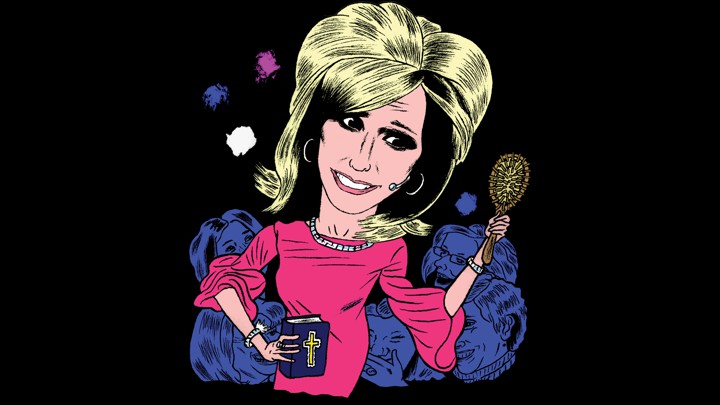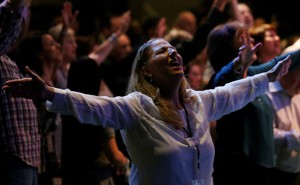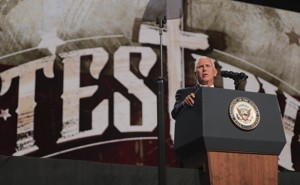“According to a study conducted by Pew, compared with their older peers, Millennial evangelicals are 12 percentage points more likely to favor stricter environmental regulations and 22 points more likely to support same-sex marriage.”
Beth Moore grew her flock by teaching scripture to women—and being deferential to men. Now her outspokenness on sexism could cost her everything.

When Beth Moore arrived in Houston in the 1980s, she found few models for young women who wanted to teach scripture. Many conservative Christian denominations believed that women should not hold authority over men, whether in church or at home; many denominations still believe this. In some congregations, women could not speak from the lectern on a Sunday or even read the Bible in front of men. But Moore was resolute: God, she felt, had called her to serve. So she went where many women in Texas were going in the ’80s: aerobics class. Moore kicked her way into ministry, choreographing routines to contemporary Christian music for the women of Houston’s First Baptist Church.
At the time, most Texas seminaries weren’t offering the kind of instruction she sought, so Moore found a private tutor. Slowly, she started getting invitations to speak at women’s luncheons and study groups, in exchange for a plate of food or a potted plant. In tiny church social halls, she laid the cornerstone of an evangelical empire.
Moore’s audience seemed to be starved for a teacher who understood their lives. To them, she was a revelation: a petite bottle blonde from Arkadelphia, Arkansas, who could talk seriously about Jesus one moment and the impossibility of finding decent child care the next. As charismatic as her male peers, she was also earnest and charmingly self-deprecating. Friends call her Beth La Ham.
In one of her most famous talks, Moore describes an encounter with a haggard, elderly man in an airport terminal. Suddenly, she feels called by God to brush the man’s hair—not to bear witness to him, or even help him board his plane, but to smooth his tangled locks. Moore describes her embarrassment, recounting her inner dialogue with God, in which she tries to talk her way out of the divine directive. Ultimately, however, she obeys. What began as a comic set piece ends as a moving testament to faith and the power of intimate acts of kindness. The Lord knows what our need is, Moore says. “The man didn’t need witnessing to. He needed his hair brushed!”
By the late ’90s, women were packing sports arenas to hear Moore tell this and other parables. She earned speaking slots at big-name churches, including Hillsong and Saddleback, whose pastor, Rick Warren, calls her a dear friend. “She’s a singularly influential figure among evangelicals as a woman leader,” Ed Stetzer, the executive director of the Billy Graham Center at Wheaton College, the elite evangelical school outside of Chicago, told me. “Beth just is a category by herself.”
A publishing career followed, further magnifying Moore’s influence. She was the first woman to have a Bible study published by LifeWay, the Christian retail giant, and has since reached 22 million women, the most among its female authors. Today, her Bible studies are ubiquitous, guiding readers through scriptural passages with group-discussion questions and fill-in-the-blank workbooks. “It would be hard to find a church anywhere where at least some segment of the congregation has not been through at least one Beth Moore study,” Russell Moore, the head of the political arm of the Southern Baptist Convention (and no relation to Beth) told me.
Moore’s success was possible because she spent her career carefully mapping the boundaries of acceptability for female evangelical leaders. She rarely spoke to the press and made a point of keeping her politics to herself. Her persona embodies what a young fan described to me as the “Southern-belle white Christian woman.”
Privately, however, Moore has never cared much for the delicate norms of Christian femininity. Her days are tightly scheduled and obsessively focused on writing. She spends hours alone in an office decorated with a Bible verse written in a swirling font (“I tell you, her many sins have been forgiven,” Luke 7:47). Though she often performs domestic femininity for her audience, in her own life she has balanced motherhood with demanding professional ambitions. She traveled every other weekend while her two daughters were growing up—they told me they ate a lot of takeout. Like other Southern Baptists, Moore considers herself a complementarian: She believes the Bible teaches that men and women have distinctive roles and that men should hold positions of authority and leadership over women in the home and in the church. Yet her husband, Keith, a retired plumber, sees his vocation as helping his wife succeed. “That’s what I do,” he told me. “I lay blocks so O.J. can run.”
For decades, Moore never broke stride. In the past few years, however, she has felt out of step with the evangelical community. During the 2016 campaign, many of its leaders not only excused Donald Trump’s boorish behavior but painted him as a great defender of Christianity—evangelicals’ “dream president,” in the words of Jerry Falwell Jr. More recently, a series of high-profile pastors have been toppled by accusations of sexual misconduct. The deferential reserve that defined Moore’s career has become harder for her to maintain.
On a chilly Texas evening recently, Moore and I sat in rocking chairs on her porch. It was the first time she had invited a reporter to visit her home, on the outskirts of Houston. Moore, who is 61, was the consummate hostess, fussing about feeding me and making sure I was warm enough beside the mesquite-wood fire. But as we settled into conversation, her demeanor changed. She fixed her perfectly mascaraed eyes on me. “The old way is over,” she said. “The stakes are too high now.”
Moore was flying home from a ministry event in October 2016 when she decided to compose the tweets that changed her life. That weekend, she had glimpsed headlines about Donald Trump’s 2005 comments on the now infamous Access Hollywood tape. But it wasn’t until that plane ride, with newspapers and transcripts spread out in front of her, that Moore learned the full extent of it—including the reaction of some Christian leaders who, picking up a common line of spin, dismissed the comments as “locker-room talk.”
“I was like, ‘Oh no. No. No,’ ” Moore told me. “I was so appalled.” Trump’s ugly boasting felt personal to her: Many of her followers have confided to her that they’ve suffered abuse, and Moore herself says she was sexually abused as a small child by someone close to her family—a trauma she has talked about publicly, though never in detail.
The next day, Moore wrote a few short messages to her nearly 900,000 followers. “Wake up, Sleepers, to what women have dealt with all along in environments of gross entitlement & power,” she said in one tweet. “Are we sickened? Yes. Surprised? NO.” Like other women, Moore wrote, she had been “misused, stared down, heckled, talked naughty to.” As pastors took to the airwaves to defend Trump, she was trying to understand how “some Christian leaders don’t think it’s that big a deal.”
The tweets upended Moore’s cheerful, feminine world. Breitbart News claimed that Moore was standing “in the gap for Hillary Clinton,” borrowing a turn of phrase from the Book of Ezekiel. Moore did not support Clinton; she told me she voted for a third-party candidate in 2016. But she was horrified by church leaders’ reflexive support of Trump. To Moore, it wasn’t just a matter of hypocrisy, of making a deal with the devil that would deliver a Supreme Court seat, among other spoils. Moore believes that an evangelical culture that demeans women, promotes sexism, and disregards accusations of sexual abuse enabled Trump’s rise.
Evangelicals, Moore said, have “clearer lines between men and women and how they serve.” But sometimes, “that attitude is no longer about a role in a church. It becomes an attitude of gender superiority. And that has to be dealt with.” Moore may be a complementarian, but she is adamant that Christian men should not treat women “any less than Jesus treated women in the Gospels: always with dignity, always with esteem, never as secondary citizens.”
This may seem like an uncontroversial stance. But in the wake of her tweets, the staff at Living Proof Ministries, Moore’s tight-knit organization, “could not hang up the phone for picking it up.” She got messages from women who had read her Bible studies for years but said they’d never read another. Event attendance dropped.
A number of male evangelical leaders asked Moore to recant. A few days later, she returned to Twitter to clarify that she was not making an endorsement in the election. She felt depressed, she told me: “I can’t tell you how many times … I faced toward heaven with tears streaming down my cheeks, thinking, Have I lost my mind?”
But her reproachful tweets seem all the more apt today. In recent months, several high-profile pastors—including Bill Hybels, the founder of the Chicagoland mega-church Willow Creek—have stepped down following accusations of sexual harassment, misconduct, or assault. (Hybels has denied the allegations against him.) Paige Patterson, the head of a Southern Baptist seminary, was pushed out after reports surfaced that he had downplayed women’s physical and sexual abuse throughout his years in ministry, including encouraging them not to report allegations of rape and assault to the police.
These events have emboldened Moore. Whereas her criticisms of church leaders were once veiled, she now speaks her mind freely. She blogged icily about meeting a prominent male theologian who looked her up and down and told her she was prettier than another famous female Bible teacher. She has castigated the evangelical movement for selling its soul to buy political wins. Moore is hopeful that a reckoning is finally under way. “There is a very strong saying that Peter used himself, that judgment begins in the house of God. And I do believe that’s what’s happening.”
White evangelicals helped elect Donald Trump, and they may well decide his political future, as soon as the 2018 midterms. While it can seem as if the whole of evangelicalism has embraced the president, Trump has in fact exacerbated deep fracture lines within the movement. Christians of color have expressed rage over what they see as abandonment by their brothers and sisters in the faith; many have even left their congregations.
Among women, the picture is cloudier. Polling has suggested that at least some Christian women may share Moore’s chagrin at the president’s behavior. During his first year or so in office, Trump’s approval rating among white evangelical women fell 13 points, compared with an eight-point drop among all women, according to Pew. Young Christians, in particular, may reshape evangelical politics. According to a study conducted by Pew, compared with their older peers, Millennial evangelicals are 12 percentage points more likely to favor stricter environmental regulations and 22 points more likely to support same-sex marriage. Young evangelical women may believe in male authority, but they’re also not afraid to talk about sexual abuse.
For the moment, however, most evangelical women look like Beth Moore’s traditional fan base: white and middle-aged. Not long ago, I joined a line of these women—purses slung over their shoulders, Bibles in hand—as they waited outside a mega-church near Seattle. The event was billed as an “intimate” gathering, but 5,000 women sitting in a church auditorium is intimate only by contrast with the arena-size crowds Moore hosted in the past. Trips to the bathroom were a lost cause. As a worship band warmed up the room, the energy was somewhere between a pep rally and a slumber party. On her way to the stage, Moore worked the room in stiletto boots, greeting strangers like old friends.
Onstage, she gave the kind of performance that made her evangelical-famous, a manic outpouring that combined the rhythms of a tight stand-up routine and the earnestness of a Sunday-school lesson. “Some of you are here because you are trying to just get away from the children,” she told the audience, which whooped obligingly. “Some of you are here to see if I’m as big a fruitcake as they say that I am, and”—here Moore emitted a theatrical little gasp-laugh, like helium escaping a balloon—“you probably already have your answer.”
Debbie, 54, my seatmate, had been to eight Beth Moore events. She told me she was in the midst of the worst three years of her life, but that “God’s always met me here.” As the event wound down, women ran down the aisle of the auditorium, eager to claim their salvation, weeping as they threw their bodies across the floor. Moore walked slowly among them as if in a trance, pausing to rub a back or whisper a prayer.
Above all, what women seem to want from Moore is to be seen. Her work is mostly about drying tears and praying through daily suffering and struggle. In the public imagination, evangelicalism has become synonymous with political activism. But inside the evangelical world, many people are looking for something simpler: A community. A prayer. Hope.
Many of these same women have been put off by Moore’s political turn, which was not in evidence onstage that night. Even those who might disdain Trump see her outspokenness as divisive and inappropriate for a Bible teacher. “I don’t think this is the avenue for political discussions,” said Shelly, 56. “I think it should stay focused on God.”
Moore believes she is focused on God. The target of her scorn is an evangelical culture that downplays the voices and experiences of women. Her objective is not to evict Trump from the White House, but to clear the cultural rot in the house of God.
Moore has not become a liberal, or even a feminist. She’s trying to help protect the movement she has always loved but that hasn’t always loved her back—at least, not in the fullness of who she is. This mission has cost her, personally and professionally, but she told me her only regret is that she’d let others dictate what her place in the community should be: “What I feel a little sorry for, looking back over my shoulder, is how often I apologized for being there.” She told me to note that she had a smile on her face. It was what she said during the most painful moments in our conversations.
This article appears in the October 2018 print edition with the headline “Will Beth Moore Lose Her Flock?”





No comments:
Post a Comment